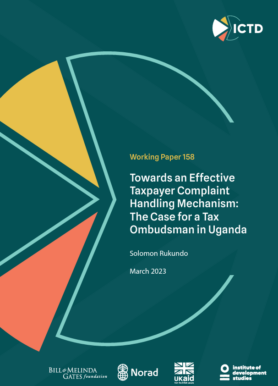Working Paper 158
It is increasingly common in many jurisdictions around the world to find an independent government office where complaints against the tax administration can be submitted. Traditional mechanisms, such as tribunals and courts, may not be effective, as these are usually very slow and costly. Many governments have developed the institution of a tax ombudsman to safeguard taxpayers’ rights and improve the overall tax system. This paper makes the case for the establishment of a tax ombudsman in Uganda. It begins with examining the concept of an ombudsman in general, and a tax ombudsman in particular. The paper proceeds to highlight the limitations of the Uganda Revenue Authority, the country’s tax administrator, and its existing oversight bodies, which justify the need for a tax ombudsman. The paper further elaborates on other justifications for the establishment of this office. The paper then briefly examines five country case studies of a tax ombudsman in operation – the United Kingdom, United States, Australia, South Africa and Tanzania. Drawing from these case studies and other literature, the paper sets out the ideal powers and roles for a tax ombudsman in the Ugandan context.
